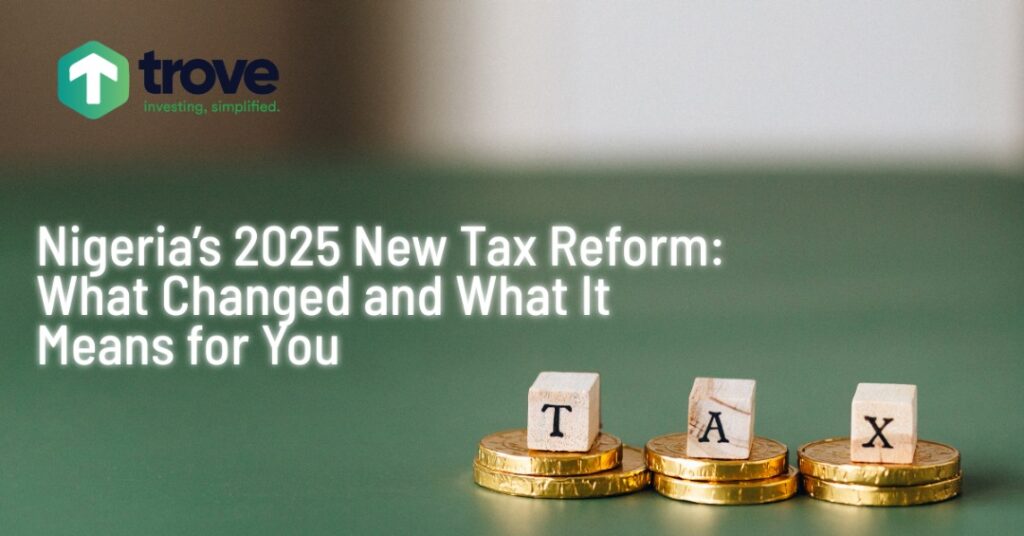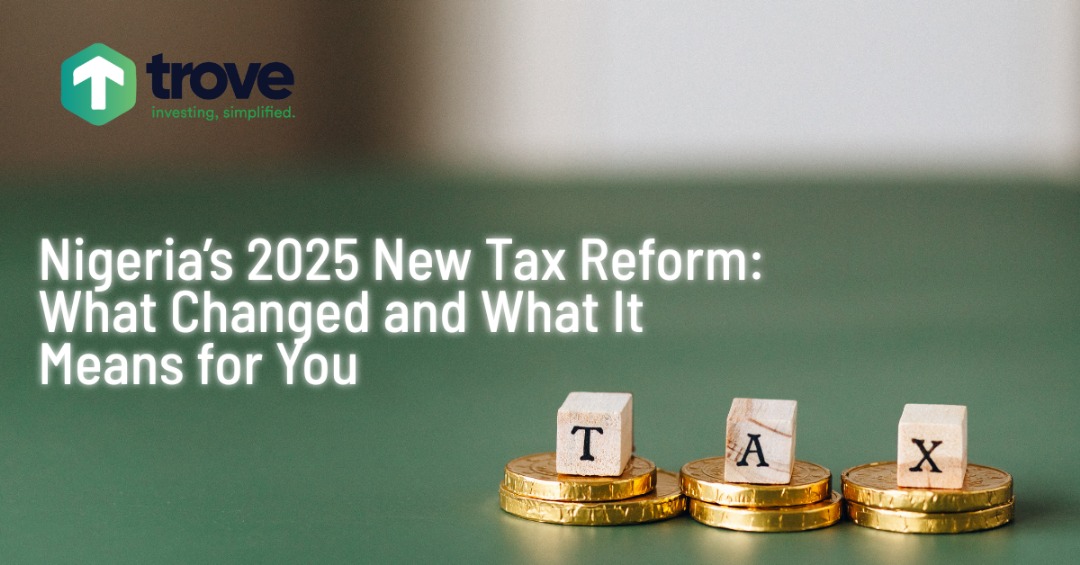There’s been a lot of talk about Nigeria’s 2025 new tax reform lately. Everywhere you turn, someone’s trying to figure out what’s changing, who’s affected, and how the numbers actually work. And honestly, it can feel like too much information floating around with no clarity about Nigerian tax law.
So, I’m going to walk you through everything you need to know about the Nigeria’s 2025 new tax reform bill which is also known as the new Nigerian tax law.

A Quick Overview of the New Nigeria’s 2025 Tax Landscape
On June 26, 2025, the Federal Government signed a major tax reform bill into law. The bill brings together four important acts:
- The Nigerian Tax Act
- The Nigerian Tax Administration Act
- The Nigerian Revenue Service Act
- The Joint Revenue Board Act
Together, these Acts introduce a unified, modern tax system designed to update the way Nigeria collects, manages, and enforces taxes. The goals include widening the tax net, increasing government revenue, supporting economic growth, and aligning the country’s tax practices with global standards.
A major part of this update involves changes to one of the key types of tax in Nigeria, the Personal Income Tax (PIT), which has received the most public attention.
Why Personal Income Tax Is in the Spotlight in Nigeria’s New 2025 Tax Reform Bill
Nigeria’s informal sector, including traders, artisans, okada riders, keke riders, tailors, food vendors, market women, and freelancers, makes up a huge portion of the workforce.
According to the 2nd Quarter 2023 report from the NBS, the informal sector accounts for 92.3% of the labour force, a number that has likely grown with increasing economic pressure.
Previously, this sector had little to no federal tax coverage. The new tax reform aims to change that by linking:
- National Identification Number (NIN)
- Bank Verification Number (BVN)
- Tax Identification Number (TIN)
This allows tax authorities to assess and collect PIT from people who previously were not tracked in the formal tax system.
The Difference Between the Old and the New Personal Income Tax
Old System (up to Dec 31, 2025)
Income was taxed progressively:
- First ₦300,000 → 7%
- Next ₦300,000 → 11%
- Next ₦500,000 → 15%
- Next ₦500,000 → 19%
- Next ₦1,600,000 → 21%
- Next ₦3,200,000 → 24%
Deductions included:
- Consolidated Relief Allowance: 20% of personal income + ₦200,000
- Pension contributions and related expenses
- Individuals earning below the minimum wage were exempt
New System (from Jan 1, 2026)
- First ₦800,000 → 0%
- Next ₦2,200,000 → 15%
- Next ₦9,000,000 → 18%
- Next ₦13,000,000 → 21%
- Next ₦25,000,000 → 23%
- Above ₦50,000,000 → 25%
Deductions include:
- 20% of annual rent (capped at ₦500,000) replaces the old consolidated relief allowance
- Pension funds, National Housing Fund contributions, National Health Insurance Scheme contributions, life insurance or annuity premiums, and gifts remain exempt
- PIT will now be calculated using the total deposits into BVN-linked bank accounts
Example: How Taxes Compare
Suppose a person earns ₦77,000 monthly (₦924,000 annually)
Pension deduction: 8% (₦73,920 yearly)
Annual rent: ₦200,000
Old System:
Taxable income: ₦465,280
Total tax: ₦39,181 annually (₦3,265 monthly)
New System:
Taxable income: ₦810,080
Total tax: ₦1,512 annually (₦126 monthly)
This shows how the new PIT system reduces the burden for lower- and middle-income earners while bringing previously untaxed informal workers into compliance.
Business and VAT Changes
- Small companies: Definition increased from ₦25 million to ₦100 million annual turnover with fixed assets under ₦250 million. These companies qualify for tax exemptions.
- Capital gains tax: Updated for companies and individuals based on PIT income bands.
- VAT: Exemptions for essentials like medical, pharmaceutical, food, tuition, electricity generation, and non-oil exports.
- VAT sharing: 10% to the Federal Government, 55% to the states, and 35% to local governments. Within states/local governments: 50% equally, 30% based on consumption, 20% based on population.
This distribution aims to increase equity and provide local governments with resources to drive development.
Potential Challenges of Nigeria’s 2025 New Tax Reform
- Double taxation risk: Informal workers already pay daily levies and union dues (₦500–₦2,000 daily). PIT does not account for these local payments, which may lead to overlapping taxation.
- Registration issues: Informal workers may face challenges registering businesses due to digital illiteracy, costs, or using relatives’ bank accounts.
- Income misidentification: With BVN-linked accounts, taxes could be assessed incorrectly if funds are deposited through third parties.
The government highlights that informal workers who register businesses may qualify for the 0% tax rate, but practical challenges remain due to the informal nature of most small businesses.
What Nigeria’s 2025 Tax Reform Means for Stock Investors
If you’ve been wondering how all this affects the stock market, here’s the lowdown. The new tax reform doesn’t just touch salaries, it now links capital gains to personal income tax rates. That means profits from selling stocks, crypto, or other investments are considered part of your total income. For individuals, this is huge: your gains aren’t taxed in isolation anymore, so your overall earnings determine the rate you pay.
Here’s the practical side:
- Lower-income investors get a break. If your total income, including gains from stocks, stays below ₦800,000 per year, you pay no tax. That’s a real incentive for first-time investors or those with modest portfolios.
- Timing is everything. For higher earners, deciding when to sell shares matters more than ever. Spreading sales across tax years or using collective investment vehicles can help manage taxes.
- Institutions face higher rates. Corporate and large investors now pay up to 30% on capital gains, encouraging longer-term holding and more strategic portfolio planning.
- Broader scope of taxable assets. Stocks, crypto, and even certain foreign investments are now clearly taxed, removing uncertainty but requiring careful record-keeping.
- Collective schemes shine. ETFs, mutual funds, and pooled investment vehicles let investors defer or optimise taxes, making it easier for smaller investors to access the market without worrying about each taxable event.
Conclusion
The Nigeria’s new 2025 Tax Reform Bill represents a major restructuring of Nigeria’s tax system. It modernizes the country’s tax system by expanding personal income tax to include informal sector workers and revising tax brackets and deductions to reduce the burden on lower- and middle-income earners.
This will help in adjusting business and VAT rules to support small companies and essential goods and linking NIN, BVN, and TIN to improve tax administration, while also presenting potential challenges such as double taxation for informal workers and registration barriers for small businesses.
Also, the new system makes stock investing more strategic and deliberate. Small investors can build portfolios with more confidence, while higher-income and institutional players need to plan carefully to maximise returns and minimise tax. Every buy, every sell, every dividend now has a tax dimension, which means thoughtful investing is more important than ever.



